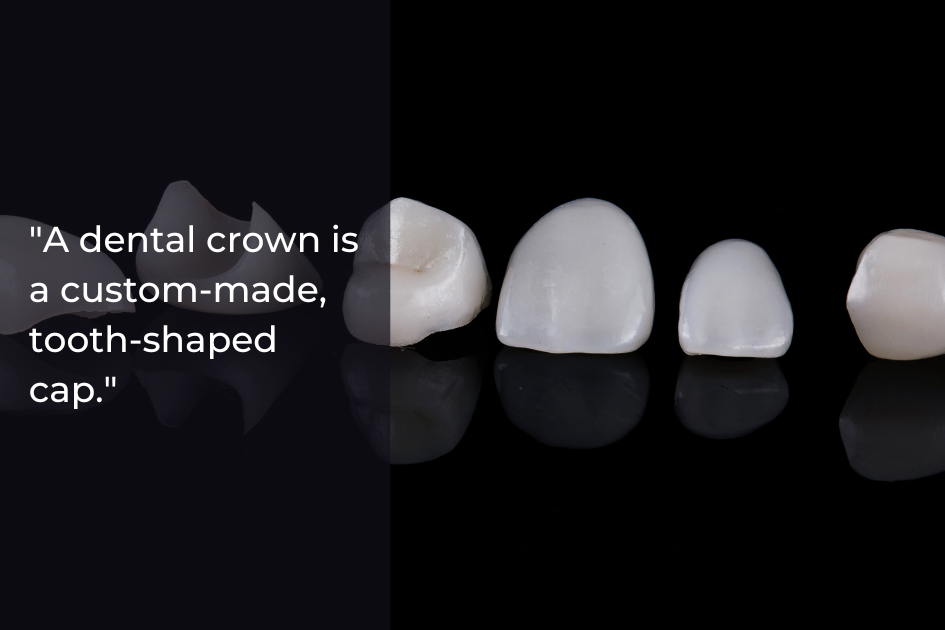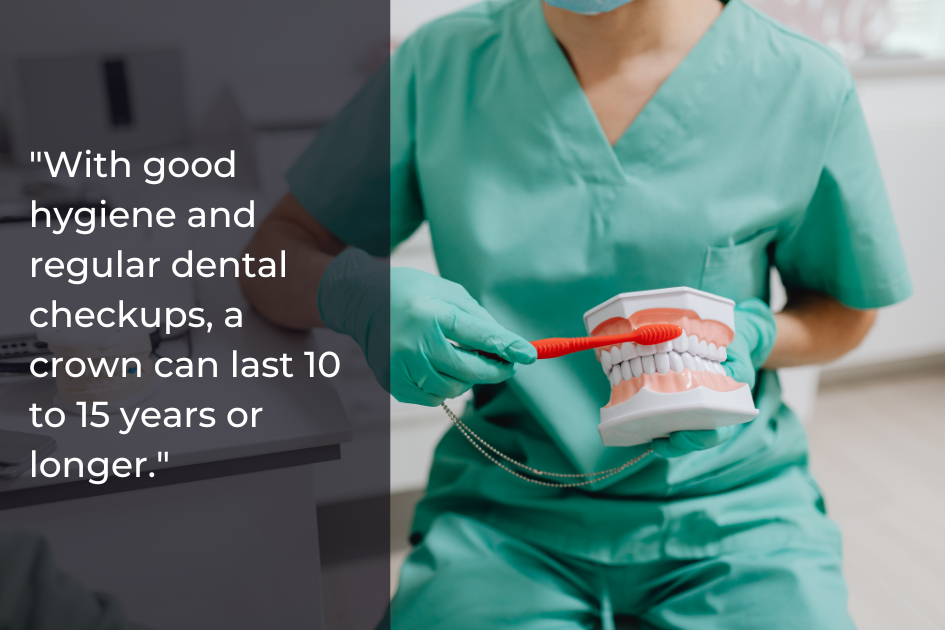
Think of a dental crown as a strong shield that restores and protects a weakened tooth. At Central Kansas Dentistry in Ellsworth, KS, we use dental crowns to save teeth compromised by decay, fractures, or wear. These full-coverage restorations restore chewing function, reduce sensitivity, and help preserve your natural smile. Whether you’re dealing with a cracked tooth, a large filling, or post-root canal recovery, crowns are a proven solution. Let’s explore when crowns are needed, the materials available, and how to care for them long-term.
What Is a Dental Crown?
A dental crown is a custom-made, tooth-shaped cap that covers the visible part of a damaged tooth. We use crowns to restore strength, function, and appearance when the natural tooth structure is too weak to stand on its own. Materials include porcelain, zirconia, porcelain-fused-to-metal, or metal alloys, each selected based on durability, aesthetics, and location in the mouth.
At Central Kansas Dentistry, Dr. Kurt Williams prepares the tooth conservatively and ensures a comfortable, secure fit. The result is a strong and lifelike restoration that blends seamlessly with your natural smile.
When Is a Dental Crown Needed?
Not every tooth needs a crown, but certain conditions call for the protection a crown provides. We may recommend a crown if you have:
- A tooth with deep decay or a failing filling
- A cracked or fractured tooth causing pain when chewing
- A weakened tooth after root canal therapy
- Severe enamel erosion or worn-down teeth
- Misshapen or discolored teeth that need cosmetic improvement
In many cases, a crown helps us save a tooth that might otherwise require extraction.
How Crowns Protect Weak Teeth
Teeth weakened by decay or injury are vulnerable to further damage. A dental crown reinforces that structure, surrounding the tooth like a helmet and distributing bite forces evenly. This added support protects the tooth from cracking, relieves pressure, and restores proper function.
For patients who grind their teeth or have a heavy bite, crowns made from durable materials like zirconia offer added resistance to wear. After a root canal, crowns are essential for preventing future fractures and maintaining the integrity of the tooth.
What to Expect During the Crown Procedure
The process typically takes two appointments at our Ellsworth office:
First Visit:
- We examine the tooth, take digital X-rays, and plan your restoration.
- The tooth is reshaped to make room for the crown.
- We take impressions to send to a dental lab.
- A temporary crown is placed to protect your tooth while the permanent one is made.
Second Visit:
- We remove the temporary crown and clean the tooth.
- The permanent crown is checked for fit, comfort, and appearance.
- It’s cemented in place, and we make final adjustments to your bite.
Our goal is to ensure comfort, function, and longevity at every step.

Types of Dental Crown Materials
At Central Kansas Dentistry, we select crown materials based on your oral health, location of the tooth, and cosmetic preferences:
- Porcelain crowns offer natural-looking translucency and are ideal for front teeth.
- Zirconia crowns combine durability and esthetics, often used for molars or patients with strong bites.
- Porcelain-fused-to-metal crowns add strength for back teeth while maintaining a tooth-colored appearance.
- Metal crowns, such as gold, are less common today but may still be used in certain cases for their strength and longevity.
We’ll help you choose the material that fits your needs, appearance goals, and bite strength.
Pros and Cons of Dental Crowns
Crowns are a reliable option, but it’s important to understand both their benefits and potential drawbacks:
Benefits:
- Restore chewing ability and comfort
- Strengthen and protect weakened teeth
- Improve appearance and color
- Prevent further decay or damage
Potential Drawbacks:
- Requires enamel removal during preparation
- May cause short-term sensitivity
- Can chip or wear over time, especially if you grind your teeth
Dr. Williams carefully plans each crown to ensure a precise fit and long-term success.
Caring for Your Dental Crown
Crowns are strong, but they still require proper care. With good hygiene and regular dental checkups, a crown can last 10 to 15 years or longer.
Here’s how to protect your crown:
- Brush twice daily with a soft-bristle toothbrush
- Floss around the crown gently, especially near the gumline
- Avoid biting down on hard foods, ice, or pens
- Wear a nightguard if you grind your teeth
- Keep up with your preventive visits every six months
If your crown feels loose or sensitive, contact us promptly. Early care prevents complications.
Crowns Versus Veneers
Patients often ask whether a crown or a veneer is the right choice. The answer depends on the tooth’s condition and the desired result.
- Crowns are better for teeth that are structurally weak, broken, or treated with a root canal. They offer full coverage and strength.
- Veneers are used for front teeth that are intact but need esthetic improvements like whitening or reshaping.
Dr. Williams will help you evaluate both options and choose the one that suits your smile, health, and long-term goals.
Alternatives to Dental Crowns
Not every damaged tooth requires a crown. When appropriate, we consider more conservative options:
- Inlays and onlays restore only the damaged portion of the tooth, preserving more natural structure.
- Dental veneers improve the appearance of healthy front teeth with minimal prep.
- Tooth bonding is an affordable solution for small chips or cracks.
- Extractions and dental implants may be necessary if the tooth cannot be saved.
We always present the best options based on your needs, budget, and long-term oral health.

When to Call Central Kansas Dentistry
If you’re experiencing discomfort or suspect something is wrong with your crown, don’t wait. Call us if you notice:
- Persistent pain or sensitivity
- A loose, chipped, or cracked crown
- A strange taste or odor around the tooth
- Irritation or swelling near the gums
We’ll examine the area, take X-rays if needed, and recommend repairs or replacement to restore comfort and function.
Conclusion
Dental crowns are an excellent solution for restoring and protecting damaged teeth. At Central Kansas Dentistry, we use high-quality materials and precision techniques to ensure your crown looks natural, feels comfortable, and lasts for years. Whether you’re recovering from a root canal or dealing with a cracked molar, we’re here to help you make informed decisions about your care.
If you’re ready to protect a vulnerable tooth or improve your smile, schedule a crown consultation with our Ellsworth dental team today.
